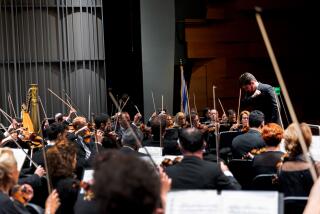Cellist Answered to a Different Role Call in Army
- Share via
Armies are notorious for launching a lot of things, but string quartets usually aren’t among them. Nevertheless, that is how the Daniel String Quartet got its start.
“When you are 18, in Israel, you have to go to the army for three years,” cellist Zvi Maschkovski said in a recent phone interview from New York, where the group was making the first stop of a tour that brings the quartet to the Irvine Barclay Theatre tonight.
“There was a very small possibility of getting the army service postponed if you got very high marks playing or auditioning for the music academy” of Tel Aviv, he said. “Every year, six boys were chosen to finish their studies and then go into the army. I was lucky enough to get very high marks. But, still, afterward you had to go.”
Once inducted, Maschkovski and some chums tried to figure out a way to keep their music skills intact. So they formed a string quartet and offered to play for the other soldiers.
“We had to prove a string quartet would be hip,” he said. “After a long time, they said, ‘OK, we’ll try it.’ So we made arrangements from light classical pieces. Right then, an arrangement of Mozart’s Symphony No. 40 was popular. People didn’t know it was classical music. So we arranged it for a string quartet.
“Classical music wasn’t so desired in the army,” he said. “So we arranged other things, mostly very rhythmical music that people knew. My task at the beginning of the performance was to get the attention of the soldiers so they wouldn’t throw us off the stage. We succeeded. We used to play six or seven times a day, at all the fronts.”
In the summers, they got a break to participate in a three-week music festival held in the Daniel House in the Carmel Mountains, west of Nazareth.
“A music journalist came to interview us and asked, ‘What’s your name?’ What’s our name? We didn’t have a name. We were in the Daniel House, so we said, ‘The Daniel Quartet.’ ”
Violinists Joan Berkheimer and Misha Furman, violist Itamar Shimon and Maschkovski now live in Holland, where they also teach at the Rotterdam Conservatory. Berkheimer, who is Dutch, joined the group about a year and a half ago. The others are original members. All had the same teacher: Rami Shevelov, a renowned pedagogue.
Maschkovski called him a “great teacher” whose way of approaching the music was “to deepen the meaning of the music so you didn’t just play the notes but looked for what is behind them, what is between the lines. What does it say? What does it mean?
“There is a story, there are meanings in the music. You have to find that and get it across. You can’t just say Mozart was a nice, lovely young guy who had a lot of talent. He had pains, he had feelings, he had moods. He was describing a lot of things. So it’s not only the form of the music you’re concerned with--playing it aesthetically and in tune and nicely--but expressing what the composer actually felt in every phrase, in every note he wrote.”
Is it so easy to find that meaning?
“Of course we argue about that!” he said. “You argue about a literary piece. You argue about Shakespeare. Even people who study the Bible all their lives . . . there are translations and commentaries about every word, turning it upside down and inside out, asking, ‘What does it mean?’
“Only music is even more difficult because it stays abstract. As in pictures, you can see different meanings. Someone says, ‘It’s very bright, very happy.’ Someone else says, ‘I feel grief, passion.’ So of course there are arguments about what does the composer really mean here.
“But like actors bringing a play to the stage, where different people are playing different roles, they have to agree to play it one way at the same moment to create the same atmosphere,” he continued. “So that’s our task--to bring the music on stage in one way.”
* The Daniel String Quartet plays music by Mozart, Odon Partos, Shostakovich and Dvorak (with pianist Anton Kuerti) tonight at the Irvine Barclay Theatre, 4242 Campus Drive. 8 p.m. $14 to $25. The program is co-sponsored by the Laguna Chamber Music Society and the Philharmonic Society of Orange County. (714) 854-4646.
More to Read
The biggest entertainment stories
Get our big stories about Hollywood, film, television, music, arts, culture and more right in your inbox as soon as they publish.
You may occasionally receive promotional content from the Los Angeles Times.










